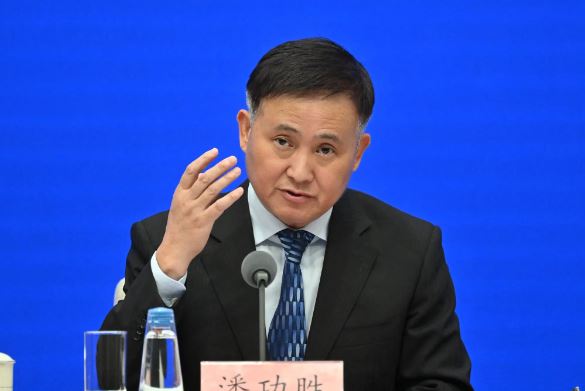China’s central bank, the People’s Bank of China (PBOC), unveiled a series of aggressive measures on Tuesday aimed at stimulating borrowing, reviving economic growth, stabilizing the housing market, and curbing deflationary pressures. This move marks the boldest attempt by Chinese authorities since the pandemic to halt the nation’s economic slowdown.
The measures include slashing short-term interest rates, reducing rates on existing mortgages, lowering the minimum down payments for housing purchases, and loosening regulations to allow state-controlled commercial banks to lend a greater portion of their assets.
Pan Gongsheng, the governor of the PBOC, emphasized at a rare press conference that the central bank is prepared to unleash further liquidity if needed. “We are ready to free banks to lend even more money if necessary,” Pan said, signaling the central bank’s willingness to take additional steps to support the faltering economy.
The PBOC’s most immediate action was to cut its benchmark seven-day interest rate to 1.5 percent from 1.7 percent, just days after the U.S. Federal Reserve also cut its rates by half a percentage point. Additionally, the PBOC allowed commercial banks to reduce the amount of reserves they are required to hold by half a percentage point, effectively freeing up an additional $140 billion for lending to households and businesses.
One of the more significant changes was to mortgage policy. The PBOC authorized lenders to cut interest rates on existing mortgages by about half a percentage point, which could bring rates for some existing mortgages below 4 percent. Moreover, the minimum down payment for second homes, often bought as investments, was slashed from 25 percent to 15 percent of the property’s value, making it easier for investors to re-enter the market.
In tandem, the central bank also made it easier for companies to borrow funds to repurchase their shares and for major shareholders to increase their stakes in companies—moves that typically help to stabilize and raise stock prices. Investors, long waiting for decisive action, reacted positively to the news. Mainland China’s stock markets, which have been among the world’s worst performers this year, surged more than 4 percent.
However, despite the sweeping nature of these interventions, there are doubts about whether they will be enough to reverse the downturn. Surveys indicate that many businesses are reluctant to borrow money, regardless of interest rates, due to concerns over whether they can generate enough sales to repay loans in the current economic climate.
Pan acknowledged these challenges, stating that the central bank stands ready to implement further reserve cuts in the coming months, potentially doubling the amount of money available for lending.
The commercial banks will face a squeeze on their revenues from these policies, especially from the lower mortgage rates. In response, the PBOC announced that banks would be allowed to pay less interest on deposits, a measure aimed at encouraging consumers to spend more rather than save.
The housing market remains a major source of concern. Home prices have dropped by approximately 10 percent annually over the past three years, and economists had feared the decline would accelerate in the coming year before Tuesday’s measures. Many families have significantly reduced their spending after seeing their savings erode as housing prices plummeted. Apartments in China have long served as a primary source of household wealth, accounting for two-thirds or more of family assets.
The collapse of major property developers has severely shaken confidence in the market, leaving millions of households in limbo as they wait for the completion of homes for which they’ve already paid. The PBOC’s measures aim to restore stability, but with sales of new apartments plummeting and developers struggling to deliver on their promises, the road to recovery is uncertain.
The broader economy is also showing signs of strain. In major cities like Beijing and Shanghai, once-bustling neighborhoods and restaurants have seen a sharp decline in foot traffic and business activity. A week prior to the PBOC’s announcement, restaurants in Shanghai that were once fully booked with lines out the door had become easy to get into, even on weekends.
Many Chinese and Western economists are now calling for the government to ramp up fiscal spending to complement the central bank’s actions. However, the finance ministry has been cautious about increasing national borrowing levels. A report by Capital Economics, a research firm, acknowledged that the PBOC’s steps are “a move in the right direction” but cautioned that they are “likely insufficient to drive a turnaround in growth unless followed up with greater fiscal support.”
While Tuesday’s measures provide some hope for an economic recovery, the real test will be whether they can restore confidence in the housing market and spur businesses and households to borrow and spend. Without broader fiscal intervention, the path to sustained growth remains uncertain.

